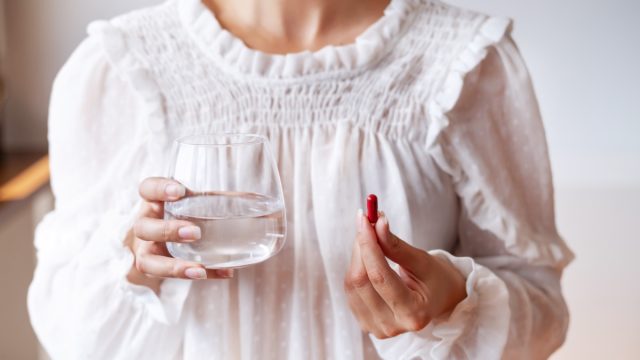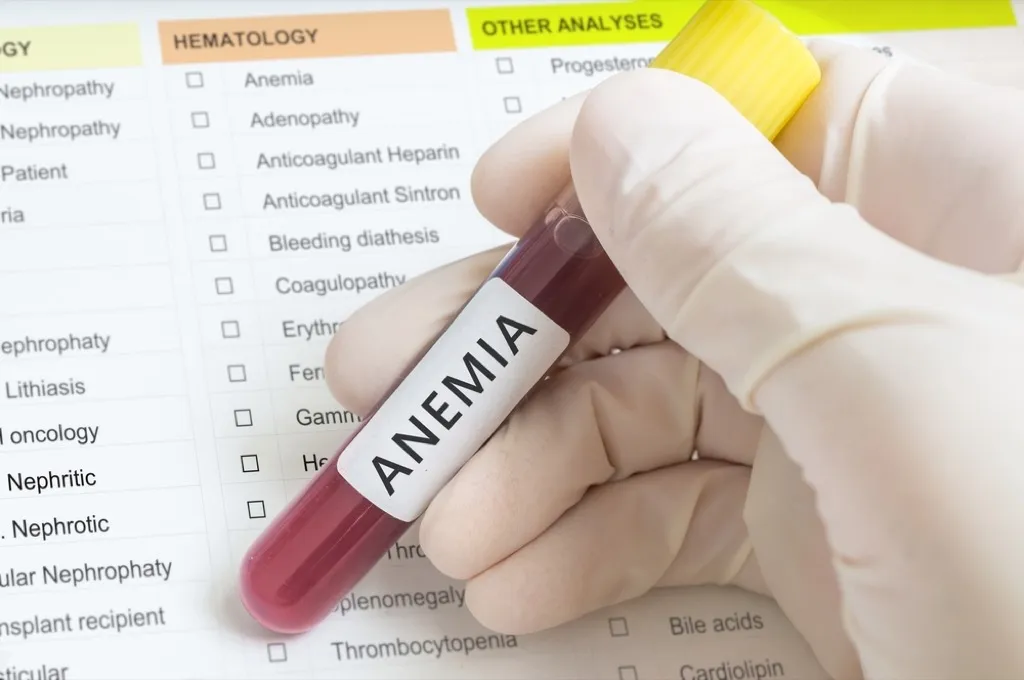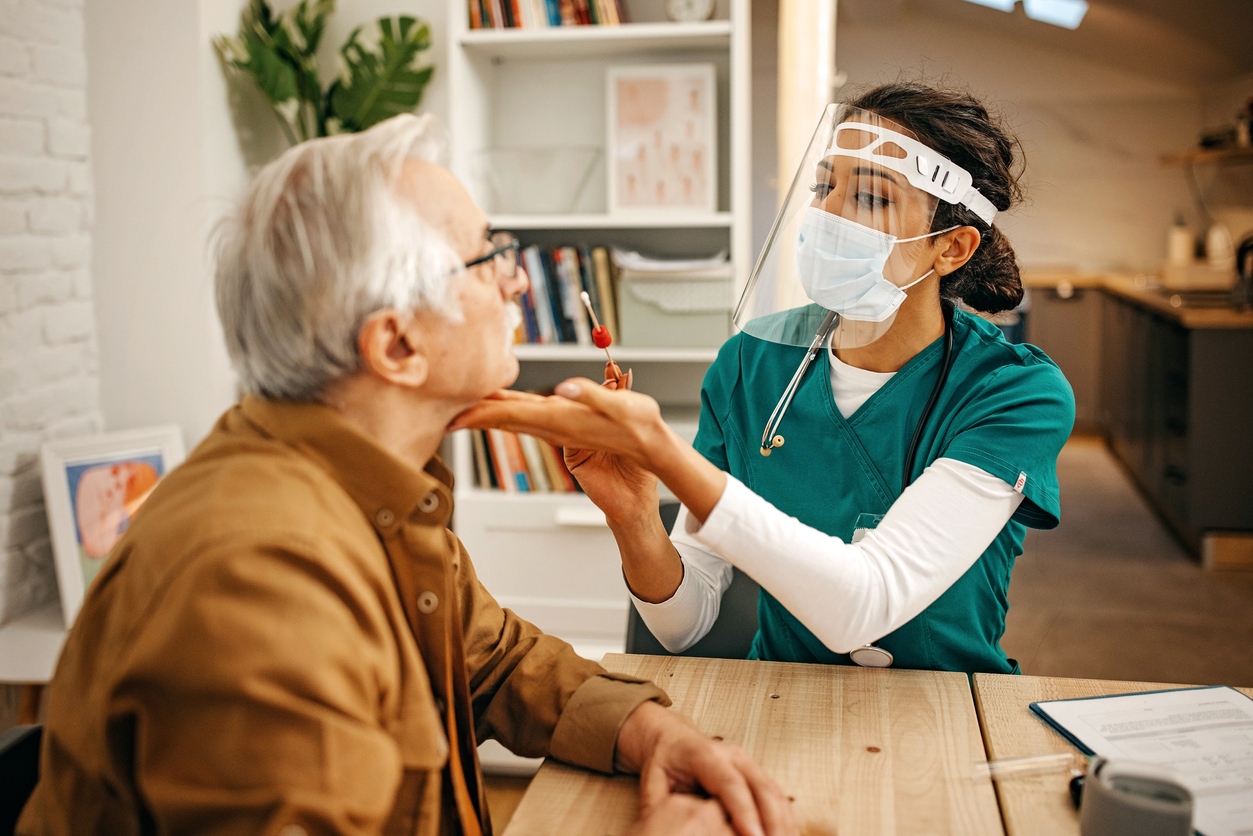6 Surprising Benefits of Taking an Iron Supplement

Most often, people get iron from their diets—in particular, from iron-rich foods such as lean meats, poultry, fish, beans, lentils, fortified cereals, and dark leafy greens. However, in cases of deficiency, doctors also commonly recommend taking an iron supplement, which can help to significantly raise one’s iron levels. Doing so can have a major impact on your health since iron deficiency can lead to serious complications of the heart and lungs.
“According to the Global Burden of Disease Study 2016, iron deficiency anemia is one of the five leading causes of years lived with disability burden, and is the first cause in women,” notes a report published by the American Society of Hematology (ASH).
Wondering what you might stand to gain by adding an iron supplement to your routine? Read on to learn the six surprising benefits of taking iron supplements, according to dietitians, nutritionists, and other health experts.
RELATED: 7 Surprising Benefits of Taking Magnesium Every Day.
1
It lowers your anemia risk and reduces symptoms.

It probably doesn’t surprise you to learn that having low iron can lead to iron deficiency anemia—but it may surprise you to learn just how common a problem this is.
According to the ASH report, “a worldwide survey showed that in 2010, anemia still affected one third of the population, with approximately half of the cases resulting from iron deficiency.”
Taking an iron supplement can be a quick and easy way to reduce your risk of anemia—and can help reduce your symptoms if you already suffer from the condition.
In fact, Krutika Nanavati, RDN, a dietitian and nutritionist, and a medical advisor at Clinicspots, says that iron supplementation can play “a crucial role in the production of red blood cells, effectively alleviating symptoms like fatigue, weakness, and overall malaise commonly associated with anemia.”
RELATED: 7 Supplements That Actually Keep You From Getting Sick.
2
It enhances cognitive function.

Taking an iron supplement can also boost your neurological and cognitive health.
“Iron plays a vital role in cognition, as there is a well-established connection between iron levels and brain function,” Nanavati explains. “It assists in the production of myelin, a substance that acts as insulation for nerve fibers, ultimately improving the transmission of nerve impulses.”
Chrissy Arsenault, RDN, MBA, a registered dietitian at Trainer Academy, agrees that iron is essential for normal cognitive development, particularly in children: “Adequate iron intake is crucial for proper brain function, concentration, and learning.”
RELATED: 10 Surprising Benefits of Taking Fish Oil Every Day.
3
It may improve symptoms of ADHD.

One particular way that taking an iron supplement may improve your cognitive health is by improving symptoms of Attention Deficit/Hyperactivity Disorder (ADHD), research shows.
“When you think of someone who is iron deficient, you envision a person who is pale and tired—not a hyperactive child, bouncing off walls,” writes the ADD resource magazine, ADDitude, pushing back on this perception.
“A 2004 study, published in The Archives of Pediatrics and Adolescent Medicine, found that 84 percent of children with ADHD had significantly lower levels of iron, compared with 18 percent of kids without ADHD. The lower the levels of ferritin—a protein found inside cells that store iron—the more severe the symptoms,” their experts write.
RELATED: 21 Surprising Signs You Have a Vitamin Deficiency.
4
It can boost your immune system.

If you find yourself getting sick often, an iron deficiency could be to blame and supplements may be in order.
“Worldwide, several observational studies have shown that iron deficiency is frequently associated with increased susceptibility to infection,” says a 2022 study published by the Journal of Blood Medicine.
Nanavati suggests that this has to do with a type of white blood cell known as lymphocytes—the two main types being B cells and T cells. These attack invading bacteria, viruses, and toxins, making you less vulnerable to infection. “[Iron] facilitates the maturation of lymphocytes, which are vital immune cells, fostering their growth and augmenting the body’s capacity to combat illnesses,” she explains.
RELATED: 7 Supplements That Actually Keep You From Getting Sick.
5
It can make your workouts easier.

You may also notice improvements at the gym when you begin taking iron supplements, research shows.
“Iron is critical to optimal athletic performance because of its role in energy metabolism, oxygen transport, and acid-base balance,” explains a 2014 study published in the medical journal Applied Physiology, Nutrition, and Metabolism. It notes that endurance athletes are at heightened risk for deficiency, due to “increased iron needs and inadequate dietary intake.”
Lexi Moriarty, MS, RDN, CSSD, a certified sports dietitian and the owner of Fueled + Balanced Nutrition, adds that “low iron stores or iron deficiency anemia can make workouts feel harder and lead to symptoms like shortness of breath and easy fatigue.”
RELATED: The 5 Best Supplements to Strengthen Your Hair After 50.
6
It supports healthy skin, hair, and nails.

According to the Mayo Clinic, there are several vitamins and nutrients that can naturally lead to radiant skin, shiny hair, and strong nails. “Vitamins A, E and D; iron; healthy fats; carbohydrates; and protein are especially important for skin, hair and nail health,” their experts write.
Arsenault agrees that iron deficiency is a common culprit behind “brittle nails, hair loss, and dry or pale skin,” and says taking a supplement may help.
Ask your doctor about testing for vitamin and iron deficiencies, so you can proceed under the supervision of a trusted medical professional.
For more wellness advice sent directly to your inbox, sign up for our daily newsletter.
Best Life offers the most up-to-date information from top experts, new research, and health agencies, but our content is not meant to be a substitute for professional guidance. When it comes to the medication you’re taking or any other health questions you have, always consult your healthcare provider directly.
- Source: https://ghdx.healthdata.org/gbd-2016
- Source: https://ashpublications.org/blood/article/133/1/30/6613/Iron-deficiency
- Source: https://pubmed.ncbi.nlm.nih.gov/15583094/
- Source: https://www.ncbi.nlm.nih.gov/pmc/articles/PMC8859536/
- Source: https://www.ncbi.nlm.nih.gov/pmc/articles/PMC8859536/
- Source: https://www.mayoclinichealthsystem.org/hometown-health/speaking-of-health/get-radiant-hair-skin-and-nails-naturally